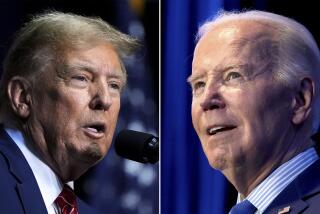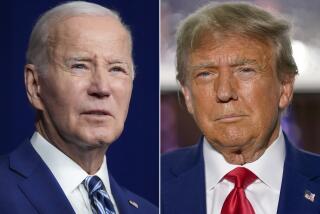Obama, Huckabee win in Iowa
DES MOINES — Democrat Barack Obama and Republican Mike Huckabee swept to victory Thursday night in the Iowa caucuses, dispatching their more established rivals and shredding any sense of inevitability in the 2008 presidential race.
The results were a serious setback for Democrat Hillary Rodham Clinton, who finished a close third behind John Edwards, and for Republican Mitt Romney, who finished second in his race.
For Obama, the win was especially resonant, as an overwhelmingly white state ratified the Illinois senator’s bid to become the nation’s first black president.
Both New York Sen. Clinton, a former first lady, and Romney, who poured millions of his personal fortune into the campaign, had hoped to quickly wrap up their nominations with a string of wins beginning in Iowa.
But the outcome -- after the costliest, most unpredictable contest in caucus history -- dispelled any notion that the presidential campaign would settle into certainty soon.
From Iowa, the contest heads to New Hampshire for a primary Tuesday, with Clinton no longer a front-runner, and Huckabee and Romney facing a stiff challenge from a revitalized Sen. John McCain of Arizona.
In Iowa’s Democratic race, Obama finished with 38% to Edwards’ 30% and Clinton’s 29%.
On the Republican side, with 96% of Iowa precincts reporting, Huckabee led with 34%, compared with 25% for Romney. Former Sen. Fred Thompson of Tennessee and McCain were tied at 13% each, and Rep. Ron Paul of Texas had 10%.
“Tonight I love Iowa a whole lot,” Huckabee told cheering supporters at a hotel on the Des Moines River. “Tonight I hope we will forever change how Americans look at their political system and how we elect presidents.”
Nearby, in a cavernous convention hall, Obama took the stage flanked by his wife, Michelle, and their two daughters to address a sea of supporters who hoisted red “Stand for Change” placards.
Obama’s showing was powered by an exceptionally high turnout -- especially young people, many of whom embraced his call for dramatic change of a capital paralyzed by backbiting and partisanship.
“You know, they said this day would not come,” he began. “They said our sights were set too high. They said this country was too divided, too disillusioned, to ever come together. But on this January night, at this defining moment in history, you have done what the cynics said we couldn’t do.”
Obama continued: “This is the moment when we tore down barriers that divided us too long . . . when we finally gave Americans who never participated in politics a reason to stand up and to do so. This was the moment when we finally beat back the politics of fear and doubt and cynicism.”
A subdued Clinton, speaking a few blocks away, signaled her plans to battle on by pressing the case she has made against Obama for months.
“What is most important now is that as we go on with this contest, that we keep focused on the two big issues,” Clinton told supporters. “That we answer -- correctly -- the questions that each of us has posed: How will we win in November 2008 by nominating a candidate who will be able to go the distance, and who will be the best president on Day One?”
Former Sen. Edwards of North Carolina declared his second-place finish a victory in the face of Obama’s and Clinton’s huge spending advantages.
“What we’ve seen here in Iowa is two candidates who thought their money would make them inevitable,” he told backers at a Des Moines rally. “It is not over.”
The results claimed a pair of casualties on the Democratic side: Sens. Christopher J. Dodd of Connecticut and Joseph R. Biden Jr. of Delaware abruptly dropped out of the race.
Others claimed victory, of a fashion.
“We made it to the Final Four,” New Mexico Gov. Bill Richardson said in a statement. “Now we are going to take the fight to New Hampshire.”
Richardson and the other laggards face a daunting precedent: No candidate has ever won the White House without finishing in one of his party’s top three spots for their party in the Iowa contest.
For months, energy and enthusiasm seemed to be running the Democrats’ way, and the results on caucus night bore that out: 239,000 Iowans turned out to participate in the Democratic caucuses, nearly double the 120,000 who participated on the GOP side. Both were records.
For all the criticisms -- that the caucuses are too complicated, too quirky, too undemocratic -- the 1,781 neighborhood gatherings offered the first meaningful test of a campaign that has been well underway for more than a year.
And they were particularly significant for the money and momentum promised the winners, who will need both as the campaign launches into a more intensive phase.
The caucuses are followed by a rapid succession of contests that will be decided over the next 4 1/2 weeks, culminating in a 24-state extravaganza Feb. 5 that includes California.
Romney effectively conceded defeat in a Fox News interview less than an hour after the GOP caucuses began. Later, at a hotel ballroom in West Des Moines, he told supporters: “Well, we won the silver. Congratulations to Gov. Huckabee for winning the gold. Nice job.”
The former Massachusetts governor went on, smiling stiffly: “You win the silver in one event, it doesn’t mean you’re not going to come back and win the gold in the final event -- and that we’re going to do.”
Still, it was a stinging defeat.
Less than six weeks ago, Huckabee, a Baptist minister, was considered an also-ran in Iowa with even worse prospects nationally. But strong support among Christian conservatives helped him pass Romney and hold on to win despite a series of widely publicized gaffes.
Romney, who invested millions of dollars in Iowa -- easily outspending his opponents -- and savaged Huckabee in a series of negative TV ads, faces a potential must-win election in New Hampshire.
At his party -- flanked by his wife, Janet, and actor Chuck Norris -- Huckabee predicted his victory would ignite “a prairie fire of new hope and zeal.”
But he faces a stiffer test in New Hampshire, where the political terrain looks less favorable. Evangelical Christians, who voted overwhelmingly for the former Arkansas governor, made up about 6 in 10 Iowa caucusgoers. In years past, evangelicals have made up fewer than 20% of the New Hampshire electorate.
McCain, who easily carried New Hampshire in 2000, may be the biggest beneficiary of the Iowa results. He was locked in a tight race for third place with Thompson.
About half an hour after Huckabee’s victory became apparent, McCain and his wife walked beaming into a Manchester, N.H., meeting room to the cheers of about 40 supporters.
“I think that the lesson of this election in Iowa is that: one, you can’t buy an election in Iowa; and two, that negative campaigns don’t work. They don’t work there, and they don’t work here in New Hampshire,” he said.
He flatly predicted: “We are going to win New Hampshire.”
On the Democratic side, Obama seemed to benefit the most from the large Iowa turnout.
More than half of those who participated said they were first-time caucusgoers, according to a survey of those entering polling places, and about 4 in 10 voted for Obama, compared with about 3 in 10 for Clinton.
By a large margin, Democratic caucusgoers placed a higher premium on change than experience, and that too boosted Obama. Slightly more than half of Democrats said their top priority was bringing about change, and Obama won the support of about half of those voters. Just 20% said experience was most important, and nearly half of those backed Clinton.
Obama also benefited from overwhelming support among young voters. Nearly a quarter of those who turned out Thursday night were younger than 30, and nearly 6 in 10 of those supported Obama, compared with fewer than 2 in 10 for Clinton.
With the Iowa results in -- and a mass exodus of candidates, reporters and other camp followers -- the focus of the presidential contest abruptly shifts from the agricultural heartland to the hamlets and high-tech centers of New Hampshire.
After speaking to supporters, several candidates boarded chartered jets and left Iowa to get in a full day of Granite State campaigning.
Voters there pride themselves on making up their own minds, which does not always mean ratifying the decision of Iowans; a scornful saying holds that Iowans pick corn and New Hampshire picks presidents.
The race in each state is as different as the landscape. The Democratic contest has been largely a battle between Clinton and Obama, with Edwards running far back in third place.
On the Republican side, Romney and McCain are battling for first place, with former New York City Mayor Rudolph W. Giuliani and Huckabee trailing well behind.
After sending conflicting signals about his desire to compete -- reaching out extensively through mailers and a phone-bank effort, but visiting only occasionally -- Giuliani ended up finishing sixth in Iowa.
--
Times Staff Writers Maria L. La Ganga, Joe Mathews, Seema Mehta, Peter Nicholas, James Rainey, Maeve Reston, Louise Roug and researcher Nona Yates contributed to this report.
--
(BEGIN TEXT OF INFOBOX)
The numbers
Democrats
Barack Obama: 38%
John Edwards: 30%
Hillary Rodham Clinton: 29%
Bill Richardson: 2%
Joseph R. Biden Jr.: 1%
Christopher J. Dodd: 0%
Dennis J. Kucinich: 0%
Republicans
Mike Huckabee: 34%
Mitt Romney: 25%
John McCain: 13%
Fred Thompson: 13%
Ron Paul: 10%
Rudolph W. Giuliani: 3%
Duncan Hunter: 0%
More to Read
Sign up for Essential California
The most important California stories and recommendations in your inbox every morning.
You may occasionally receive promotional content from the Los Angeles Times.











